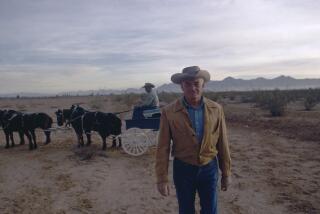Western Lit panel focuses on the inner cowpoke
- Share via
The sensitive cowboy is not a newsworthy item, but the sensitive academician of western literature may well be. Gender studies in the land of John Wayne and Natty Bumpo have always presented some interesting challenges to hearty academics. There are the Willa Cather disciples. And there is the Wallace Stegner camp. And the two forces rarely converge, until this year.
The 37th annual Western Literature Assn. Conference was held recently in Tucson, and as dry as that sounds, it’s an academic group close-knit enough to share tequila drinking and salsa dancing and late-night conversations over questions like, “Which famous character in western fiction would you most like to sleep with?” Such evenings are needed to provide some relief from daytime panels titled “Class, Capitalism and Cather,” “Ecovision and Narrative” and “Countertextualizing Cultural Studies in the Southwest Borderlands.”
For the record:
12:00 a.m. Nov. 6, 2002 For The Record
Los Angeles Times Wednesday November 06, 2002 Home Edition Main News Part A Page 2 National Desk 16 inches; 589 words Type of Material: Correction
Western literature -- An article in the Oct. 21 Calendar about the Western Literature Assn. Conference incorrectly characterized the source of a quote. UC Santa Cruz professor Forrest Robinson was not referring to himself but rather was quoting writer Wallace Stegner when he said, “I was a crybaby, full of self-contempt,” and when he said a spanking from his father left him “dreaming murder.”
But something snapped this year: Suddenly, these tall, stoop-shouldered academics in short sleeves (the West’s equivalent of Ivy League elbow patches) were doing something called “personal narrative” to introduce their literary analysis. Stories of “My father and how I came to study Zane Grey” predominated over slogan-slinging and “issues of influence.”
Indeed, at an early-morning panel on “Revising Models of Masculinity in the Old and New West,” three of the four male panelists told stories of growing up with fathers who imposed a rigid emotional torpor on their families.
“After my mother’s funeral,” said professor David Fenimore from the University of Nevada, Reno, “my brothers and I went to a sports bar.” He was visibly moved by this confession, and so was his audience. This kind of honesty at an academic conference where, normally, nothing moves, including the hotel air, can be refreshing. Fenimore’s paper, “The Sensitive Nurturing Gender-Bent Gunfighter in Zane Grey’s ‘Mysterious Rider,’ ” analyzed not only Fenimore’s own childhood but also Grey’s and its effect on his views of masculinity.
Forrest Robinson, a Stegner scholar from UC Santa Cruz and about as stern-looking a professor as you would never want to meet on a weekend night out, began his lecture by saying, “I was a crybaby, full of self-contempt.” A spanking from his father left him “dreaming murder.” His recent work looks at Stegner’s role as a parent, in his life and his fiction. He points often to Stegner’s “emotional incapacity” and the author’s own admission thereof.
Not everyone rejoiced in the triumph of personal-as-political. Susan Rosowski, who runs a Cather Studies Center at the University of Nebraska, resented the burden of personal “theater” on the text. “It creates a kind of self-consciousness that leads to highly selective reading.”
Others found it refreshing, particularly among the male academics.
“Nobody wants to hear how I looked at the ocean and thought of my mother, but some of us think that there is a place for personal stories,” Fenimore said. “If only to liven things up.”
More to Read
Sign up for our Book Club newsletter
Get the latest news, events and more from the Los Angeles Times Book Club, and help us get L.A. reading and talking.
You may occasionally receive promotional content from the Los Angeles Times.








